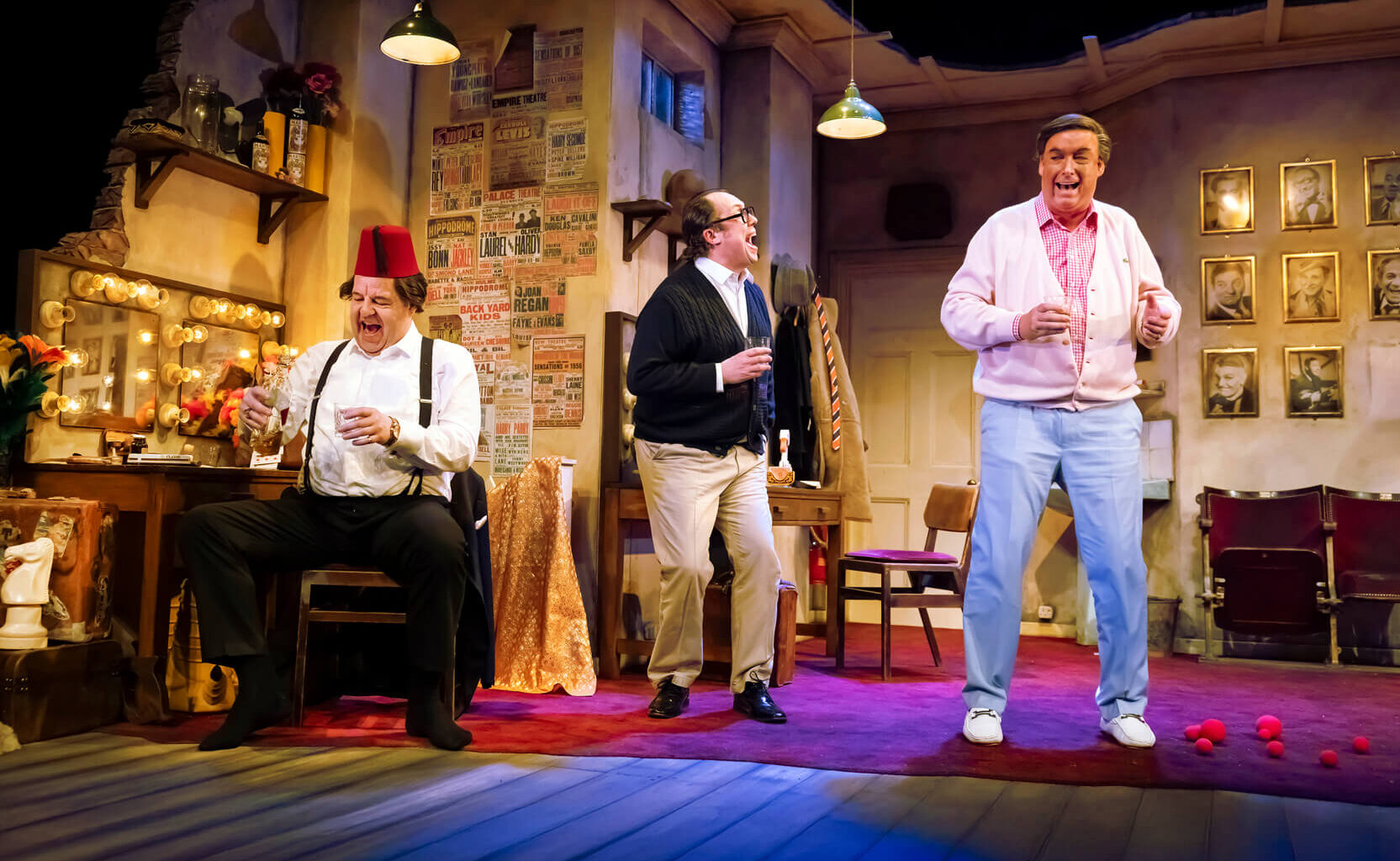Writer and Director: Paul Hendy
We enter the auditorium to see an archetypal dressing room in a provincial theatre. Lee Newby’s set is  incredibly detailed, setting the action firmly in the past in a building that has, perhaps, seen better days – the mirrors surrounded by bright lights that sometimes fizz and pop certainly suggest as much. On the back wall is an array of famous faces, comedians of the past, some of them looking impossibly youthful, such as you might find in many such theatres even today.
incredibly detailed, setting the action firmly in the past in a building that has, perhaps, seen better days – the mirrors surrounded by bright lights that sometimes fizz and pop certainly suggest as much. On the back wall is an array of famous faces, comedians of the past, some of them looking impossibly youthful, such as you might find in many such theatres even today.
It’s a bit of a stretch to imagine Tommy Cooper, Bob Monkhouse and Eric Morecambe (without Ernie) sharing such a dressing room at the height of their powers, but the effort of stepping into writer Paul Hendy’s world is worth it; the punchline is well worth the set-up.
First on stage is Cooper (Damian Williams). Williams perfectly captures the giant of a man that was Cooper, a man who could get more laughs from looking slightly bewildered than many comedians could hope for in a night of carefully honed material. But also a man who was a gift to impressionists everywhere, with his trademark moves, chuckles and catchphrases. Cooper’s own performances were typically caricatures; how to make sure that this Cooper does not slip too far that way? In fact, Williams gives a masterclass of a man who is just funny, regardless of what he does. Yes, we have ‘Just like that!”, but Williams’ Cooper is a believable, three-dimensional human being.
Cooper is soon joined by Monkhouse (Simon Cartwright). Cartwright has Monkhouse’s smooth delivery and slightly robotic gestures off to a T. He brings us a Monkhouse who, as he says, takes a chisel to jokes, then polishes them to get the maximum impact from the minimum words. There’s some good-natured professional jealousy as he compares his process with Cooper’s effortless style (and later, that of Morecambe) and as he suggests tweaks to improve Cooper’s delivery of a joke. Cartwright’s Monkhouse is almost painfully introspective as he analyses each word and pause in his delivery.
Finally, these two are joined by Morecambe (Bob Golding), who has a striking resemblance to the man himself, supported by the physicality that we associate with Morecambe. There’s banter between the men as they discuss their careers and styles. We get a glimpse into the compulsion that drives comedians, the desire for applause and laughs while being insecure and only ever as good as their last joke. Comedy, we learn, is a compulsion, not just the bright lights and acclaim, but also the lonely journeys and cold sausage rolls in service stations, the impact on family life. While there are genuine laugh-out-loud moments – a piece where Cooper explains how he uses a small white gate to get laughs is a delight – there are also moments of great pathos as each ponders on what they have had to give up for this life on the road.
The Last Laugh started life as a short film nearly ten years ago, starring these three men and garnering a clutch of award nominations and some wins. And occasionally, one feels that the story has been stretched a little in this live version. The inclusion of each comedian sharing parts of his act and essentially giving a masterclass in comedy is welcome and enjoyable, as is the peek into their offstage personae. But some of the discussion of technique maybe outstays its welcome a touch and, enjoyable as they are, it’s not obvious what the music hall and signature songs actively add.
Nevertheless, the evening belongs to the cast who bring these comedy greats back to life in a completely believable way and leaving the audience with broad smiles on their faces as they make their way out. Most will learn something they perhaps weren’t aware of before: this reviewer was certainly unaware that, early in his career, Monkhouse had been part of a double act, for example. It’s a joyous night out, a tribute – in the best sense of the word – to three men who even now command a special place in the hearts of so many.
Runs until 26 July 2025 and on tour
